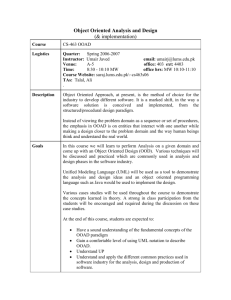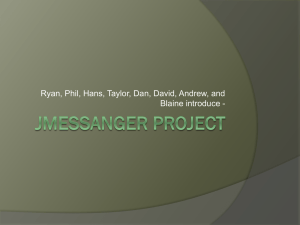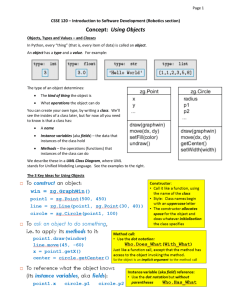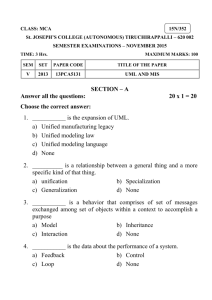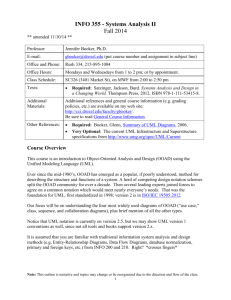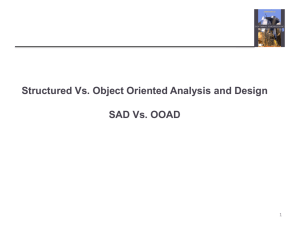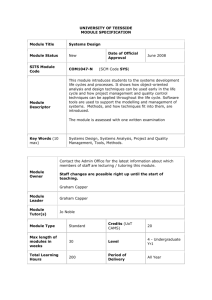Component and Deployment
advertisement
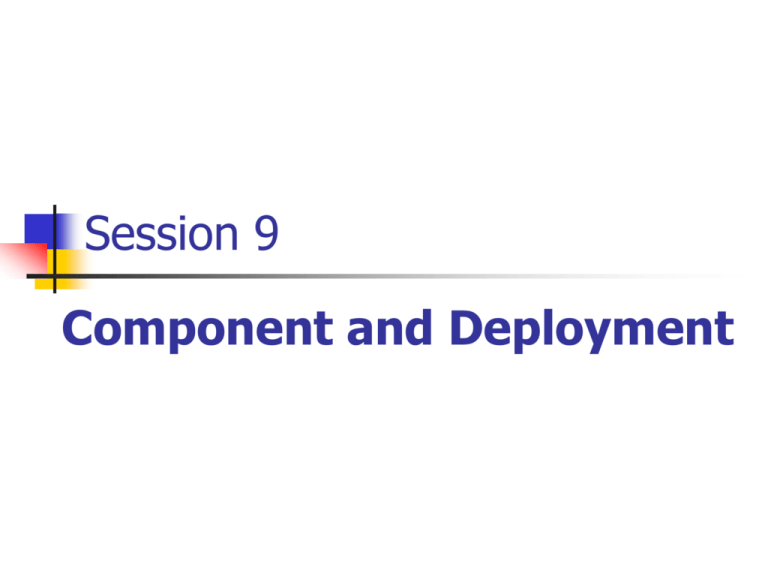
Session 9 Component and Deployment Review State Diagrams represent the software entities in terms of their states Sequence diagram give the visual description of the sequence of the events that happen within the software entities being developed Collaboration Diagrams illustrate the communication between objects Activity Diagrams present the activities within the software entities. This presents a pictorial view of the flow of events that happens within the system being developed OOAD with UML / Session 9 / 2 of 17 Objectives Discuss the concept of component diagram and deployment diagram Draw component diagram and deployment diagram Discuss the popular UML diagramming and modeling tools OOAD with UML / Session 9 / 3 of 17 Component Diagram Structural Diagram Component is a physical and replaceable part of system and models physical things Used to describe the dependencies between various software components OOAD with UML / Session 9 / 4 of 17 Interface Representation OOAD with UML / Session 9 / 5 of 17 Use Component Diagram OOAD with UML / Session 9 / 6 of 17 Deployment Diagram Visualizes the distribution of components across the enterprise OOAD with UML / Session 9 / 7 of 17 Nodes Run-time physical object that represents a computational resource, generally having at least a memory and often processing capability as well OOAD with UML / Session 9 / 8 of 17 What is deployment diagram? Allow the capturing of the topology of the system nodes, including the assignment of run-time elements to nodes Allows to visually see potential bottlenecks Formed by Nodes, connections (Shown with stereo types) and components OOAD with UML / Session 9 / 9 of 17 Deployment Diagram Examples-1 OOAD with UML / Session 9 / 10 of 17 Deployment Diagram Examples-2 OOAD with UML / Session 9 / 11 of 17 Major tools for Model Creation Rational Rose Visual UML Microsoft Visio OOAD with UML / Session 9 / 12 of 17 Rational Rose IBM Rational Rose is a complete visual modeling solution that allows developers, project managers, engineers and analysts to visualize, understand, and refine requirements and architecture before committing them to code Rose is part of Rational Software's comprehensive and fully integrated solution designed to meet today's software development challenges Rational Rose helps you develop solid code faster Automated Code Generation Component Testing OOAD with UML / Session 9 / 13 of 17 Visual UML Affordable, easy-to-use yet powerful and fullfeatured highly UML-compliant object-modeling tool Includes UML extensions for Business Object modeling, Robustness modeling, Web Application modeling (using Conallen WAE), XML modeling, and Data modeling/Database design Standard Edition Developer Edition1 Plus Edition (with VBA) Plus - Developer Edition1 OOAD with UML / Session 9 / 14 of 17 Microsoft Visio Use Visio to easily create business and technical diagrams to think through, organize, and better understand complex ideas, processes, and systems. Easily assemble diagrams by dragging pre-defined Microsoft SmartShapes® symbols Use tools designed for specific professional disciplines for business and technical diagramming requirements throughout your organization Generate common diagram types from existing data Access context-sensitive help and task-specific templates that are updated regularly from the Web OOAD with UML / Session 9 / 15 of 17 Summing up UML OOAD with UML / Session 9 / 16 of 17 Summary Component and Deployment diagrams are Structural Diagrams in UML Component diagrams show the physical placement of the components in the system Deployment diagrams show the interconnection of the hardware and software components Rational Rose, Visual UML and Microsoft Visio are major tools to create deployment diagrams. Rational Rose is comparatively used more. Rational Rose is an complete Software Engineering tool. OOAD with UML / Session 9 / 17 of 17
